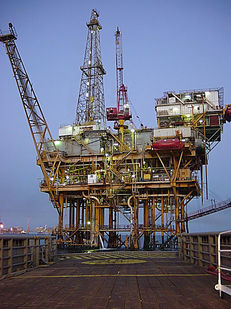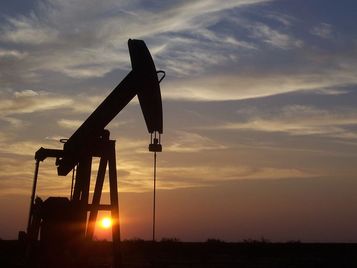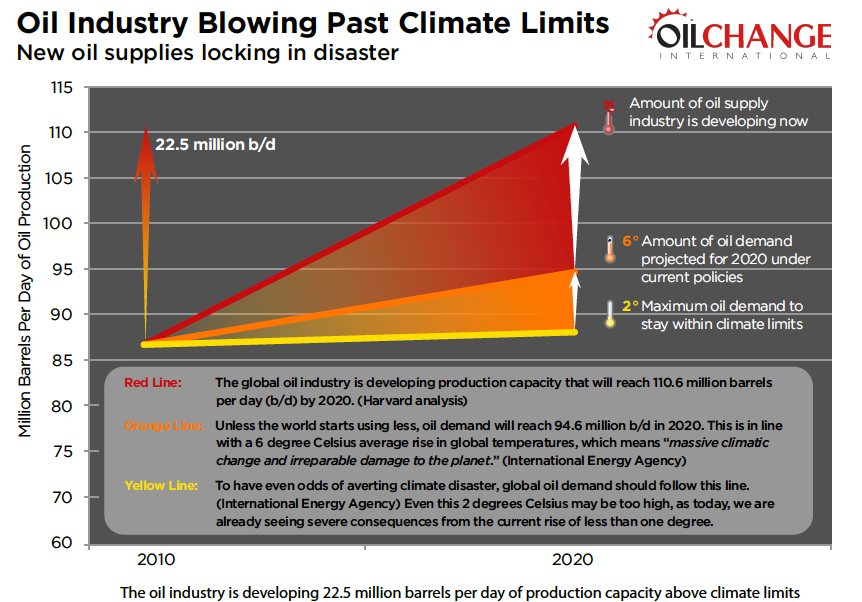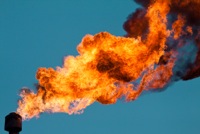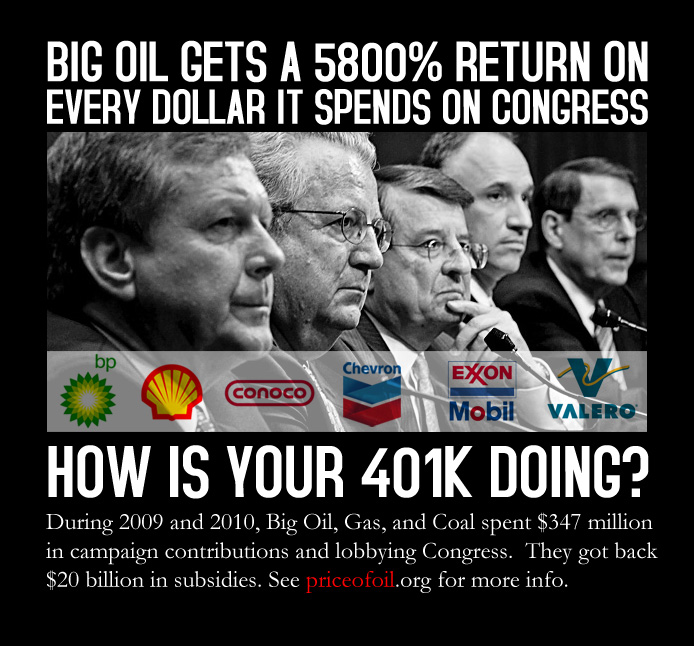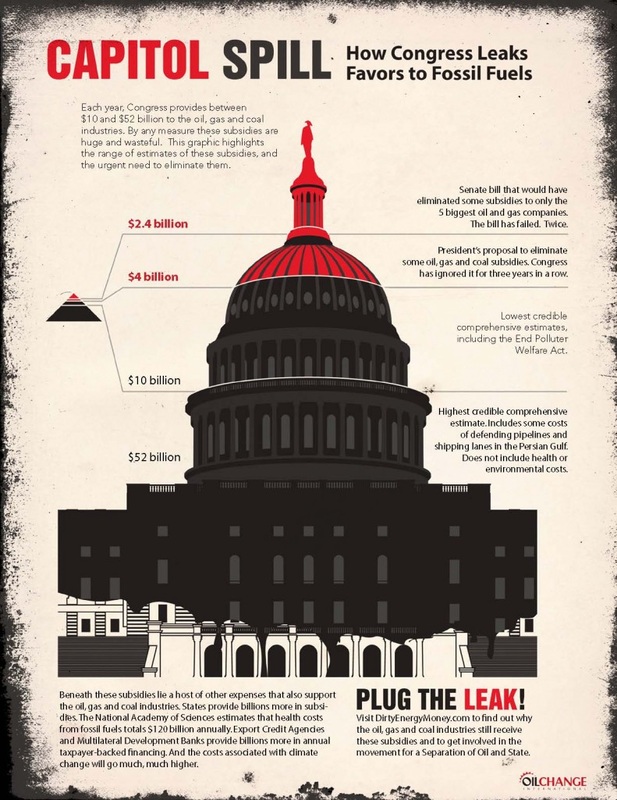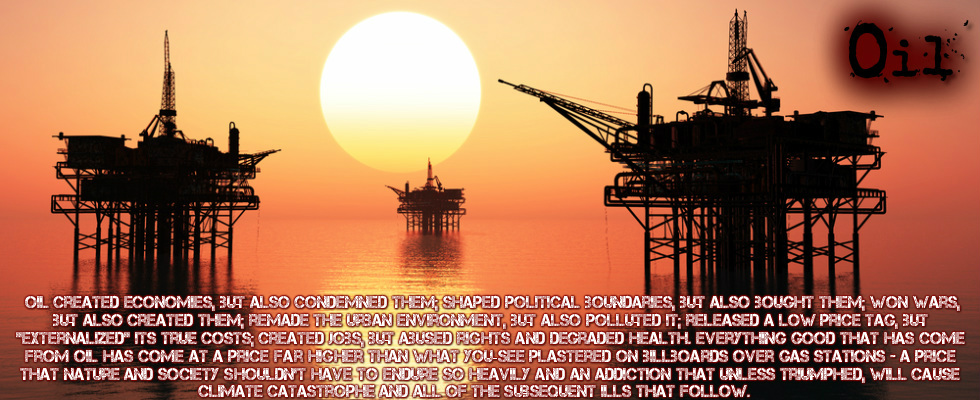
Oil
Oil, which
formed from ancient plants and animals deposited some 500 million years ago, is the world's primary fuel source for transportation and has been a defining force of our times. Oil created economies, but also
condemned them; shaped political boundaries, but also
bought them; won wars, but also
created them; remade the urban environment, but also
polluted it; released a low price tag, but
"externalized" its true costs; created jobs, but
abused rights
and
degraded health. Everything good that has come from oil has come at a price far higher than what you see plastered on billboards over gas stations - a price that nature and society shouldn't have to endure so heavily and an addiction that unless triumphed,
will cause climate catastrophe
and all of the
subsequent ills
that follow. Oil continues to play a substantial role in society, but may become a uniquely 20th century phenomenon as the world quickly burns through our supplies of oil, which at current rates, are estimated to
dwindle by the middle of the 21st century. With oil reserves becoming harder to reach and more expensive to extract, the fossil fuel industry has been turning to more unconventional sources of heavier crude oils, such as
tar sands
and
oil shale, which is the equivalent of drug addicts running out of veins in their arms and legs and turning to their toes. Tar sands is the
most destructive oil project on Earth, the
most toxic fossil fuel on the planet
and according to the world's leading, most respected climatologist James Hansen,
tar sands oil is a global warming time bomb and "game over" for the climate. Oil shale is obtained through
hydraulic fracturing, or "fracking", in an extremely water-intensive process where millions of gallons of mixed water, sand and chemicals, including ones known to cause cancer, are injected underground at very high pressures to fracture the rocks surrounding an oil or gas well and release the oil or gas from the rocks to flow into the well, which is causing a
new global water crisis
and
according to Food and Water Watch, is "threatening the air we breathe, water we drink, communities we love and climate on which we all depend."
Learn more.
The True Cost of Oil
Climate Change & Pollution
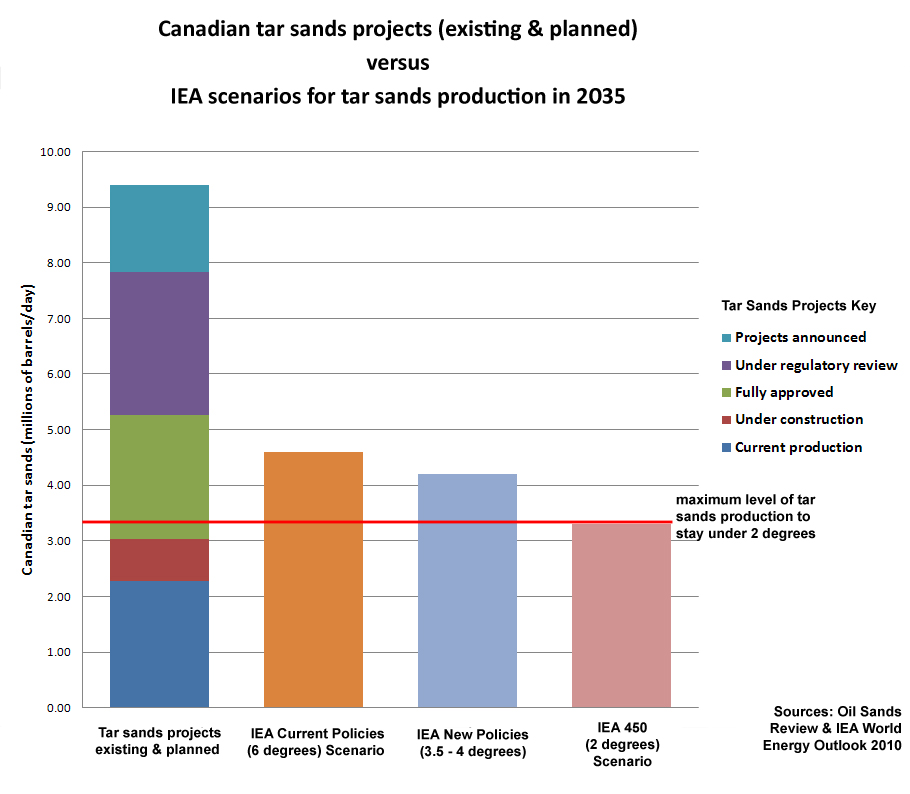
Source: Oil Sands Review & IEA World Energy Outlook 2010. Click to enlarge.
Oil accounts for
40% of global warming emissions from fossil fuels worldwide and 42% of emissions in the United States. The International Energy Agency released its
2012 World Energy Outlook, stating, "No more than one-third of proven reserves of fossil fuels can be consumed prior to 2050 if the world is to achieve the 2°C goal," which is the internationally recognized limit to rising average global temperatures in order to prevent
climate catastrophe. The global oil industry is developing a production capacity that
will blow past this 2°C temperature goal
by
planning to produce 110.6 million barrels of oil per day, which will
exceed a 6°C average rise in global temperatures
and
according to the International Energy Agency, cause "massive climatic change and irreparable damage to the planet." To put things in perspective, thus far
we have only experienced a less than 1°C rise in global average temperatures
due to the
climate lag. Moreover,
government handouts in the form of subsidies
to the already extremely profitable, mature fossil fuel industry are
blocking clean energy alternatives, which is
capable of meeting our energy needs. It's time to
end these handouts.
Discover the Effects of Climate Change
Before oil is burned into heat-trapping gases which
warm the planet, it also causes profound damage by polluting the local environment, communities and human health at virtually every link in the chain, from exploration to production to consumption. Even the extreme noise pollution created by loud seismic testing for oil can
deafen dolphins and whales and put these highly social animals at risk of injury or death
and
extensive oil and gas drilling creates chemical air pollution that produces winter ozone and volatile organic compounds
(see also)
that
a report by the Environmental Protection Agency
links to heart and lung diseases and mortality. Moreover, as the oil industry turns to more unconventional, increasingly risky sources of heavier crude oils, such as
tar sands
and
oil shale,
the impacts become more profound.
According to Oil Change International, "Exploration for new oil and gas often brings seismic explosions and the clearing of huge swaths of forest; drilling produces toxic drilling muds and waste waters; oil extraction still often results in routine gas flaring at the point of extraction. Oil transport creates additional hazards, as oil spills from pipelines, tankers and tank farms are still routine, despite industry claims of safety measures. Oil refining creates further chemical, thermal and noise pollution and affects the health and safety of refinery workers and nearby communities and ecosystems. Gasoline and many of its additives are toxic and are associated with some types of cancer, with oil industry employees and those living near refineries, transfer and storage facilities at greater risk." The costs of ignoring climate change are
unthinkable
and certainly greater than the costs of
ending our dependence on oil.
Discover Renewable, Clean Energy
Insecurity, War & Terror
Oil is an extremely volatile, geopolitically strategic energy commodity that is highly vulnerable to regional instability and market manipulation. Boosting oil production won’t protect Americans from gasoline price shocks, as proven in
a new analysis
from the Congressional Budget Office. The only way for countries, such as the United States, to truly break free of the energy insecurity associated with oil is not by drilling for more oil, further subsidizing oil companies or building more pipelines, but through reducing our reliance on oil and by
investing in alternatives to fossil fuels. As the
U.S. Department of Energy
states, "Even if the United States was entirely self-sufficient in oil, domestic crude prices would remain coupled to the global market and be subject to the global dynamics of supply/demand, as well as international events."
According to Oil Change International, "Producing more oil at home does not insulate American consumers from oil’s volatility. Keeping oil at an affordable price, or more to the point, maintaining an affordable and effective transport system, is in no way guaranteed by producing more domestic oil. While an increase in American oil supply may increase the global supply of oil, the affect this added supply can have on U.S. oil prices is very limited. This is because American oil prices are linked to global prices, which are buffeted by events in numerous oil supply regions. Additionally, the privatized American oil industry has no incentive to maintain spare production capacity that could be used to cool prices in the event of a price shock. Indeed the structure of the North American oil industry is such that its imperative is to sell its product to the highest bidder."
Food & Water Watch Report: U.S. Energy Insecurity - Why Fracking for Oil and Natural Gas is a False Solution
For many decades, there has been conflict, violence and war over oil resources, most notably in the Middle East, which
according to Oxfam America, has led to oil exporting dependent nations to suffer from unusually high rates of corruption, authoritarian government, government ineffectiveness, military spending, and civil war. Wars to defend oil supplies have cost thousands of lives and trillions of dollars. More than
4,800 U.S. service people and 118,000 civilians have been killed in Iraq alone. The
Iraq
and
Afghanistan
wars are only the latest examples of decades of U.S. military action in oil producing regions. Furthermore,
dependence on oil is also associated with a higher risk of civil war
as
countries whom depend on resource exports have a much higher risk of civil war than countries without. As
Oil Change International states, "Since the 1973 Arab oil embargo, successive U.S. administrations have equated national security with access to, and control of, oil – particularly in the Persian Gulf, which holds two-thirds of global oil reserves. In other words, as long as we need oil, we need the Persian Gulf. Faced with this unpleasant fact, every President since Carter has chosen to defend U.S. “access” to the Persian Gulf." Oil production has caused substantial conflict in areas, such as the
Niger Delta, and has
allowed oil wealth to undermine a country’s economy and politics, fund insurgents, and aggravate ethnic grievances.
Watch the Oil Factor: Behind the War on Terror
Debt, Poverty & Human Rights Abuses
According to "Drilling into Debt," an investigation on over over 200 countries into the relationship between debt and oil, their key findings were that: "Increasing oil production leads to increasing debt. Increasing oil exports leads to increasing debt. Increasing oil exports improves the ability of developing countries to service their debts, while at the same time increasing their total debt. Increases in oil production predict increases in debt size. World Bank programs designed to increase Northern private investment in Southern oil production have instead drastically increased debt." Countries rich in minerals and hydrocarbons, such as oil, tend to suffer from
high rates of poverty, malnutrition, child illiteracy, corruption, authoritarianism, civil war, indebtedness,
poverty, inequality, poor public services and stunted economic growth
in what has become known as the
resource curse.
According to Oil Change International, "It was often thought that whatever other curses oil brought, its vast revenues offered a path out of debt for oil exporting countries, and thus perhaps, eventually out of poverty. But countries that produce oil tend to be poorer, more violent, more corrupt, and less productive economically than they should be."
Learn more.
According to the
Institute of International Studies, there has been a strong connection between human rights abuses and the companies and governments associated with fossil fuel operations. Oil and other fossil fuel production has resulted in a
negative impact on gender equality
by
reducing the number of women in the labor force and consequently their political influence, forced relocation, appropriation of land, the brutal and sometimes deadly suppression of critics, and the
creation of a 'repression effect', where resource-rich countries lose democratization by allowing the government to better fund tools of repression. Although the
connections between human rights abuses and oil have been largely documented in developing countries, such as Ecuador, Nigeria and parts of the Middle East, there has been a growing documentation of communities raising
human rights concerns
in developed countries, such as Canada and the United States, which is stemming from more oil being produced in North America by extreme techniques, such as
tar sands
and
oil shale. These extreme fossil fuel extraction technologies are
adversely affecting indigenous communities in Canada
by
removing and contaminating water resources, restricting access to traditional hunting and fishing grounds and violating the treaty rights of the First Nations that are guaranteed by the Canadian constitution, and in the United States by creating
water pollution, noise, odors, health problems
and
violating state constitutions.
Learn more.
Human Health Degradation
Burning oil and oil spills lead to a plethora of consequences, ranging from
global warming
to local economic disruptions to
air,
water
and land pollution, but also lead to harmful effects on our health. Burning oil and breathing oil smoke can cause
serious damage to the lungs, irritate the respiratory tract, trigger an asthma attack, damage tissue lining both internally and externally, replace oxygen in the bloodstream with harmful gases, cause allergic reactions, immediate breathlessness, shortness of breath, extreme discomfort and cause unconsciousness and even death with extended exposure.
According to the Union of Concerned Scientists, "Exposure to carbon monoxide can cause headaches and place additional stress on people with heart disease. Cars and trucks are the primary source of carbon monoxide emissions. Two oxides of nitrogen--nitrogen dioxide and nitric oxide--are formed in combustion. Nitrogen oxides appear as yellowish-brown clouds over many city skylines. They can irritate the lungs, cause bronchitis and pneumonia, and decrease resistance to respiratory infections. They also lead to the formation of smog. The transportation sector is responsible for close to half of the US emissions of nitrogen oxides; power plants produce most of the rest. Human exposure to ozone can produce shortness of breath and, over time, permanent lung damage. Research shows that ozone may be harmful at levels even lower than the current federal air standard."
Learn more.
Crude oil is made up of
thousands of
chemical compounds, including benzene and toluene. In the event of an oil spill, these chemicals tend to evaporate soon after they reach the surface and can cause
respiratory problems, temporary central nervous system troubles, cancers at high exposure levels, chest pain, coughing, dizziness, headaches, respiratory distress, vomiting, dermatitis and other skin infections. According to the
Institute of Medicine, the dangers extend beyond those working directly on the clean-up efforts as noted in
their report: "Residents in the affected communities are also at risk for dermal exposure to either crude oil in the water or weathered oil on the beach; inhalational exposure to chemicals or compounds, such as those carried ashore by prevailing winds; or ingestion by eating potentially contaminated seafood, drinking contaminated water, or other forms of ingestion."
As Time magazine states, "At the Institute of Medicine conference, Nalini Sathiakumar of the University of Alabama noted that of the 400 tanker spills that have occurred since the 1960s, only seven have been studied. And they provide reason for caution. Oil isn't just oil — it also contains volatile organic compounds like the carcinogen benzene. "Studies [of spills] have shown us consistent evidence for oracular, neurological and dermal exposure as a result of exposure to volatile organic compounds," said Sathiakumar. "Short-term lung, kidney and liver functions could be affected."
According to Scientific American, "Some 270 people who worked on clean-up of
the Exxon Valdez spill
filed claims for respiratory problems, and follow-up surveys have found that those who had worked most closely with the spilled oil had a greater prevalence of symptoms of chronic airway disease. The damage could, however, run deeper than skin irritation and breathing difficulties. A study of clean-up workers from the 2002
Prestige oil tanker
spill off the coasts of France and Spain found increased levels of DNA damage." A
2009 report by the National Academy of Sciences
(view NY Times article)
claims that burning fossil fuels results in about $120 billion per year in health-related costs.
Explore CDC Selected Studies on the Human Health Effects of Oil Spills
Political Corruption & Loss of Democracy
As one of the most well established and profitable industries on the planet, the fossil fuel industry still gets to enjoy massive annual subsidies ranging from
$10 billion to $52 billion in the U.S.
and
over $600 billion globally, with the five biggest oil companies raking in staggering profits of
$62.2 billion in just the first half of 2012, which equates to $341 million each day. What to do with all of this extra money? Spend it on lobbying, of course! After all, big oil gets a
5800% return
on the money it spends on Congress through campaign contributions and lobbying, which equates to $59 for every $1 spent! According to Oil Change International, "In the United States,
regulations and legislation to promote transparency
and fight corruption was
opposed for years by the oil industry. The worldwide trend of
corruption surrounding oil
and gas projects is
well documented.The fossil fuel industry undoubtedly has a stranglehold on U.S. democracy, bribing elected officials with campaign contributions
and pressuring them with millions of dollars of spending in strong-armed lobbying.
In return, the industry is provided massive subsidies
while raking in mind-boggling profits and giving their executives lavish compensation packages." In the United States where there is a
broad acceptance
to end our addiction to oil and begin to address global warming, it would seem conclusive to end such subsidies, which are helping to feed corruption and climate change. However, with an industry
spending immeasurable amounts of money influencing elections and the legislative process
and with the oil and gas industry alone spending nearly
$150 million in lobbying Congress in 2011, there is undoubtedly and inevitably a distortion to the democratic process where the voices of those with the most money are heard louder than that of the American people.
As OCI puts it, "When you have a bad argument, the only way to win is to corrupt the decision-making process. And that’s exactly what the fossil fuel industry does: in order to feed their greed for massive profits, the oil, gas, and coal corporations buy support for their polluting practices. And while Americans struggle to get by, the climate heats up due to emissions from fossil fuels, and Congress pours subsidies to their industry, fossil fuel industry
CEOs swim in cash
by way of exorbitant salaries and compensation packages. With so much money to gain and politicians in their pockets, the fossil fuel industry is corrupting our government and force-feeding a status quo energy policy that will lead us to climate catastrophe."
Learn more.
"For decades, the oil industry's hold on politics has seemed inevitable and untouchable. The fossil-fuel industry poured $500 million into anti-climate lobbying and pro-oil candidates during the 2010 midterm elections. This money had enormous influence on climate policy, the price of gas, and the $4 billion in taxpayer subsidies that oil companies collect each year. In a 2012 vote to repeal those subsidies, the U.S. senators who voted in favor of Big Oil had collected five times more in oil and gas industry campaign contributions than those who voted to cut the subsidies." ~ Sierra Club

